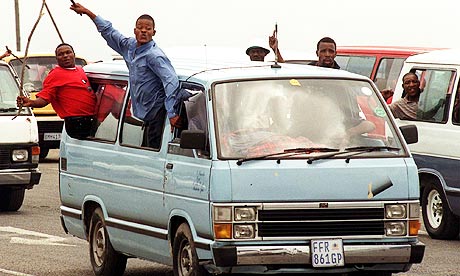
One of the most notable features of the major cities here in South Africa is the lack of a public transport system visitors feel comfortable using. It is something the government has been keen to address with the football World Cup coming to South Africa next year. Plans have been drawn up for a Bus Rapid Transit system to start in Johannesburg next September, followed by Cape Town and other cities. The intention was to get it started before this month's Confederation Cup which involves the winners of major international soccer tournaments around the world.
The buses, which would look more like single-decker trams, would use designated lanes to ease traffic congestion, with minibus taxis currently ferrying passengers who elsewhere would be on metros and trains, but it has incurred the opposition of taxi drivers, a powerful lobby group here.
The taxi system is unregulated and boasts hundreds of thousands of members. The transport plan led to protests on one main road in Johannesburg last week. Cars with more than one occupant were stopped and the passengers were ordered out and told to continue their journeys in taxis.
Government officials are meeting a recognised taxi drivers' association this week but the National Taxi Association will not be involved and its Western Cape spokesman, Mvuyisi Mente, was quoted this week as saying his members were prepared to die for their demands that the BRT system be completely owned and run by the taxi industry. A partial share has been offered.
"We will turn Cape Town into another Baghdad," he said. "We know how and we have the means to do it. I have thousands of soldiers in my ranks who are prepared to die for this. We are serious."
Doctors here earn less than taxi drivers and they are threatening to go on strike during next year's World Cup unless their demands over pay and conditions are met. An intern earns around £150 a week after taking six years to qualify. It is illegal for them to down stethoscopes here but their association is organising a wave of protests with the threat to go on strike when the football starts next year. Some 3,000 have applied to work overseas, 10% of the doctors registered in South Africa.
The government here is finding out, as its French counterpart did during the 2007 Rugby World Cup, that hosting a major sports tournament may generate significant income but it can also cost, with disaffected workers not slow to exploit the chance to cause the authorities worldwide embarrassment.
Cars with altitude
And talking of embarrassment, a group of reporters from one new organisation covering the Lions tour organised a hire car in Bloemfontein last week.
They got off to a bad start when the hire car company told them that the order had been cancelled and they would have to take a taxi into town.
An hour of negotiation followed before the company relented and wheeled out a forlorn-looking four-door that was far less grand than the 4x4 that had been ordered.
The designated driver then got in, muttering about the unfairness of it all. He reassured the car hire representative that he knew how to handle the contraption and put it into first gear.
Or what he thought was first gear. As he let the clutch out, the car shot backwards and came second in a dispute with a telegraph pole.
It must have something to do with altitude. A senior member of the media party left his laptop on the plane from Bloemfontein to Johannesburg yesterday.
He nearly sparked a major security alert when, on his way to the lounge for a connecting flight to Durban, he realised what he had done and retraced his steps, running over a patch of grass to the plane that was being boarded by passengers going on the return flight to Bloemfontein.
After being ticked off, he found the machine had been taken off. Fortunately for him, it had been taken off by an honest passenger who had handed it in to lost property.

